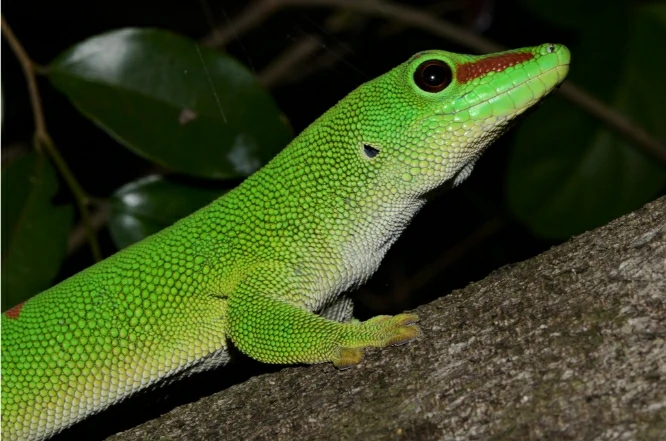Have you ever spotted a small gecko on your wall, blinking its big eyes, and wondered why you almost never see it during the day? You might ask yourself: do geckos only come out at night?
Most geckos typically come out at night, but not all. Some come out during the day, or at dawn and dusk. It really depends on where they live and how they stay safe or find food.
So, most geckos like the darkness, but day geckos show that not every gecko waits for night to start moving around.
Even geckos that are active at night may sometimes come out a little during the day, depending on their environment and what they need to survive.
Why Geckos Prefer the Night
Geckos really like the night because it gives them a lot of advantages. There are fewer predators around after the sun goes down.
Birds and bigger lizards hunt mostly during the day, so nighttime is safer.
Plus, insects are more active after dark, giving geckos plenty of food.
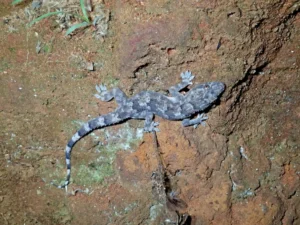
Have you noticed geckos’ eyes glowing faintly in the dark? That’s because they have a special layer behind their retina called the tapetum lucidum.
It helps them see in very dim light, kind of like built-in night vision. Cats have it too, which is why their eyes shine at night.
Nighttime isn’t just about hunting and avoiding predators. It also helps geckos stay cool.
Surfaces like rocks or walls can get very hot during the day, and geckos can’t sweat or pant like humans.
Night gives them the right temperature to move around without getting too hot.
Are All Geckos Active Only at Night?
You might think all geckos are night creatures, but that’s not exactly true. Most geckos are nocturnal, which means they’re mostly awake at night.
But some species are diurnal, meaning they’re active during the day. Day geckos from Madagascar, for example, are bright green with red spots and hunt insects in sunlight.
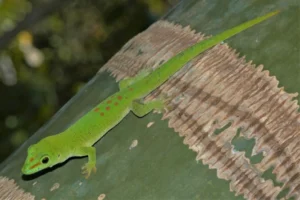
Their skin handles light well. It bounces back bright rays so they don’t get too hot, and it helps them blend into leaves.
So while most geckos prefer moonlight, some are happy to soak in the sun.
What About Geckos That Like Dawn and Dusk?
Some geckos aren’t fully night or day creatures. They’re crepuscular, which means they’re active at dawn and dusk.
Leopard geckos are a good example. They wake up as the sun sets, hunt for a while, then rest again before sunrise.
This helps them avoid extreme heat but still see well in the dim light.
Do Night-Active Geckos Ever Come Out During the Day?
Yes, geckos that are active at night can sometimes be seen in daylight, but usually for specific reasons:
-
Searching for food: If insects are active, a hungry gecko might take the chance to hunt.
-
Basking for warmth: Some geckos need a little sun to raise their body temperature after a cool night.
-
Escaping danger: If a gecko feels threatened, it might cross a sunlit wall to find a safe hiding spot.
Daytime activity is short and careful. Geckos retreat quickly to shaded areas, under leaves, rocks, or wall cracks.
That’s why most people think geckos only come out at night, they really like to stay hidden when the sun is up.
How Their Environment Affects When They Come Out
Where a gecko lives affects when it’s active. In tropical areas with warm nights, geckos can stay out longer and hunt more.
In hot deserts, they might come out just after sunset because the day heat is too strong.
Urban areas change their behavior too. Streetlights and porch lights attract insects, making hunting easier.
Geckos often gather near these lights, so you might notice them more in cities than in quiet forests.
Basically, geckos adjust their schedule depending on what gives them the best chance to eat and survive.
Why Geckos Are Harder to Spot During the Day
Even if a gecko is out during daylight, it’s easy to miss. Their skin often matches their environment, walls, tree bark, or leaves. This camouflage makes them nearly invisible when they don’t move.
Have you ever seen a gecko on a gray wall and thought the spot was just a shadow? That’s exactly what they rely on to stay safe.
During the day, they depend on blending in more than hunting.
At night, camouflage matters less because their main advantage is low-light vision.
How Geckos Rest During the Day
During the day, geckos usually hide. Some tuck under loose bark or in tiny wall cracks. Others curl up under leaves or rocks.
Their daytime rest is very important. Even if they look like they’re sleeping, they stay alert.
They can sense vibrations and shadows, so if a predator comes near, they can dart away in a split second. This hiding strategy is another reason people rarely see them during the day.
What Makes Geckos Come Out Early or Stay Out Late
Sometimes geckos start hunting at dusk or continue very late at night. What affects this?
-
Temperature: Warm nights make them more active, cool nights slow them down.
-
Moonlight: Bright moonlight helps them see better, so they hunt longer.
-
Food availability: If insects are plentiful, geckos might adjust their schedule.
Geckos are flexible. They’re mostly nocturnal, but they don’t follow a strict clock. They adjust to what’s happening in their environment.
How Light Affects Pet Geckos Indoors
If you have a pet gecko lives in a tank inside your house, the lights you give it affect when it sleeps and wakes.
Artificial light stands in for the sun, helping your gecko know when it’s time to rest or explore. A 12-hour cycle (12 hours of light, 12 hours of dark) usually works best.
When the lights turn off, that’s your gecko’s signal to start moving. If the lights are on all the time, your gecko can get confused or stressed because it can’t tell day from night.
Basically, light tells your gecko when it’s day and night.
Nocturnal vs Diurnal Geckos: Typical Routine
A Leopard Geckos’ Nightly Routine
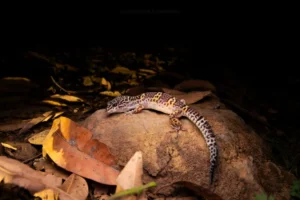
A leopard gecko’s day usually goes like this:
-
Daytime: sleeping inside its hide, staying cool.
-
Evening: slowly coming out as it gets cooler.
-
Night: exploring, hunting, moving around.
-
Dawn: going back to its hide to rest.
Feed your leopard gecko at night, and you’ll see how alert it gets. Its hunting instincts kick in right away. This night rhythm is built into its body.
Day Geckos That Love Sunlight
Day geckos like the Madagascar giant day gecko or the gold dust day gecko are active from morning to late afternoon.
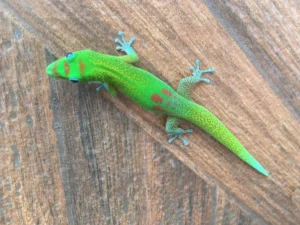
Their bright, reflective scales keep their body temperature steady and help them blend into sunlit leaves. Their eyes are built for daylight.
You’ll see them basking in sunlight or licking dew from leaves. At night, they hide to stay safe.
This shows just how flexible geckos can be with light.
How To Tell If Your Pet Gecko Likes Night or Day
It’s easy. Look at its eyes.
Geckos with vertical slit pupils (like cats) are nocturnal or crepuscular. Their pupils open wide in the dark to catch more light.
Geckos with round pupils are usually diurnal. They’re made for daylight.
So by looking at their eyes, you can tell when they feel most awake.
Why Your Gecko Won’t Eat During the Day
If your gecko ignores food during the day, it’s simple: it’s asleep.
Geckos eat when they’re awake, which for most means evening or night.
Feeding them during the wrong time can mess up their rhythm. Feeding them at dusk or after dark fits their natural hunting instincts.
So if your gecko isn’t eating, try feeding later in the day. It often works.
How Lights Around the Tank Can Confuse Geckos
Geckos are very sensitive to artificial light. If the tank is near a bright room light or window, your gecko might never get true darkness.
That can mess up its schedule. It might stay awake too long or hide all the time.
Cover part of the tank at night or turn off nearby lights so your gecko can follow its normal routine.
Do Wild Geckos Act the Same as Pets?
Yes, almost the same.
In the wild, geckos come out when the air cools and bugs start moving. They climb trees, walls, or rocks quietly under the moonlight.
Their night vision helps them see prey, and sticky toe pads let them climb silently.
Even in cities, wild geckos gather near porch lights to catch bugs. They use human light to help them hunt.
So they’re still nocturnal but can adapt to new situations.
Can You Change a Gecko’s Sleep Schedule?
You can adjust your gecko’s schedule a little by controlling light and temperature.
For example, if you make the room darker earlier in the evening, your gecko may wake up sooner.
But forcing a night gecko to live in bright light all day stresses it. Its body isn’t built for that.
Small changes are fine, but it’s best to respect its natural rhythm.
Conclusion
So, do geckos only come out at night?
Mostly, yes, but not always.
Many are nocturnal or crepuscular, coming alive in the cool, quiet hours after sunset. But day geckos show that some prefer bright mornings and sunlight.
Each gecko’s schedule matches the world it came from; hot deserts, damp forests, or sunny islands.
If you match the light in your gecko’s tank to its natural cycle, you’ll see how calm and healthy it becomes.
It’s not just about light or dark, it’s about giving your gecko the time of day when it really feels at home.
Hi, my name is Ezra Mushala, i have been interested animals all my life. I am the main author and editor here at snakeinformer.com.

